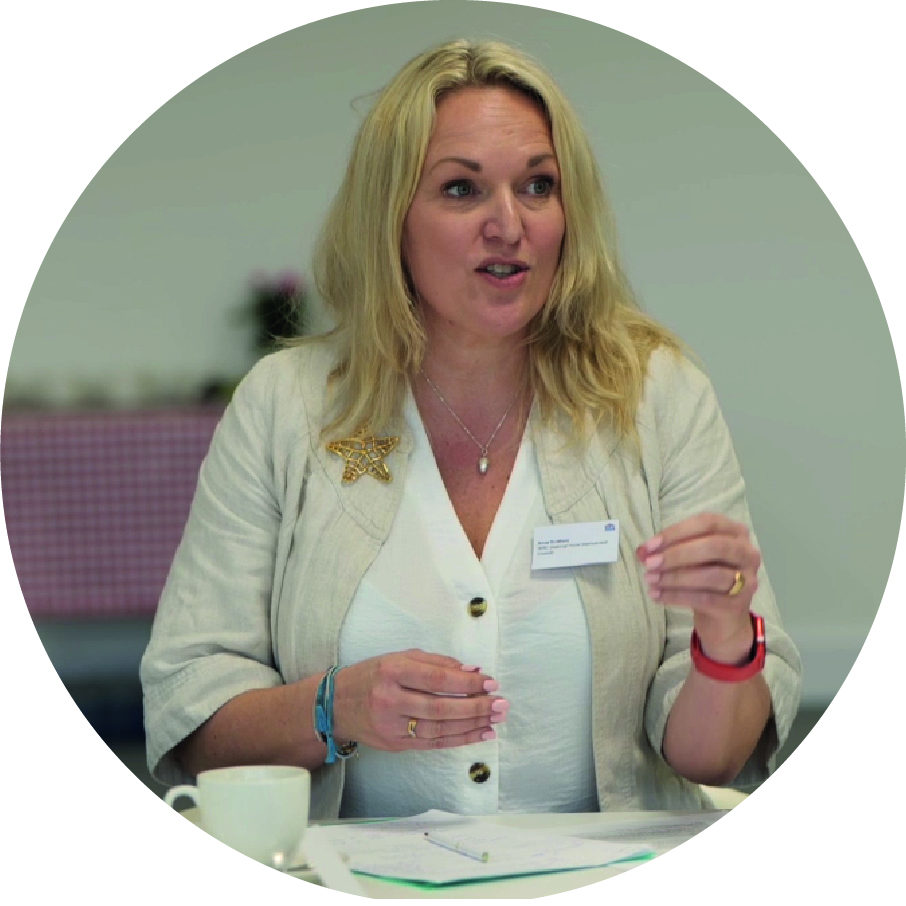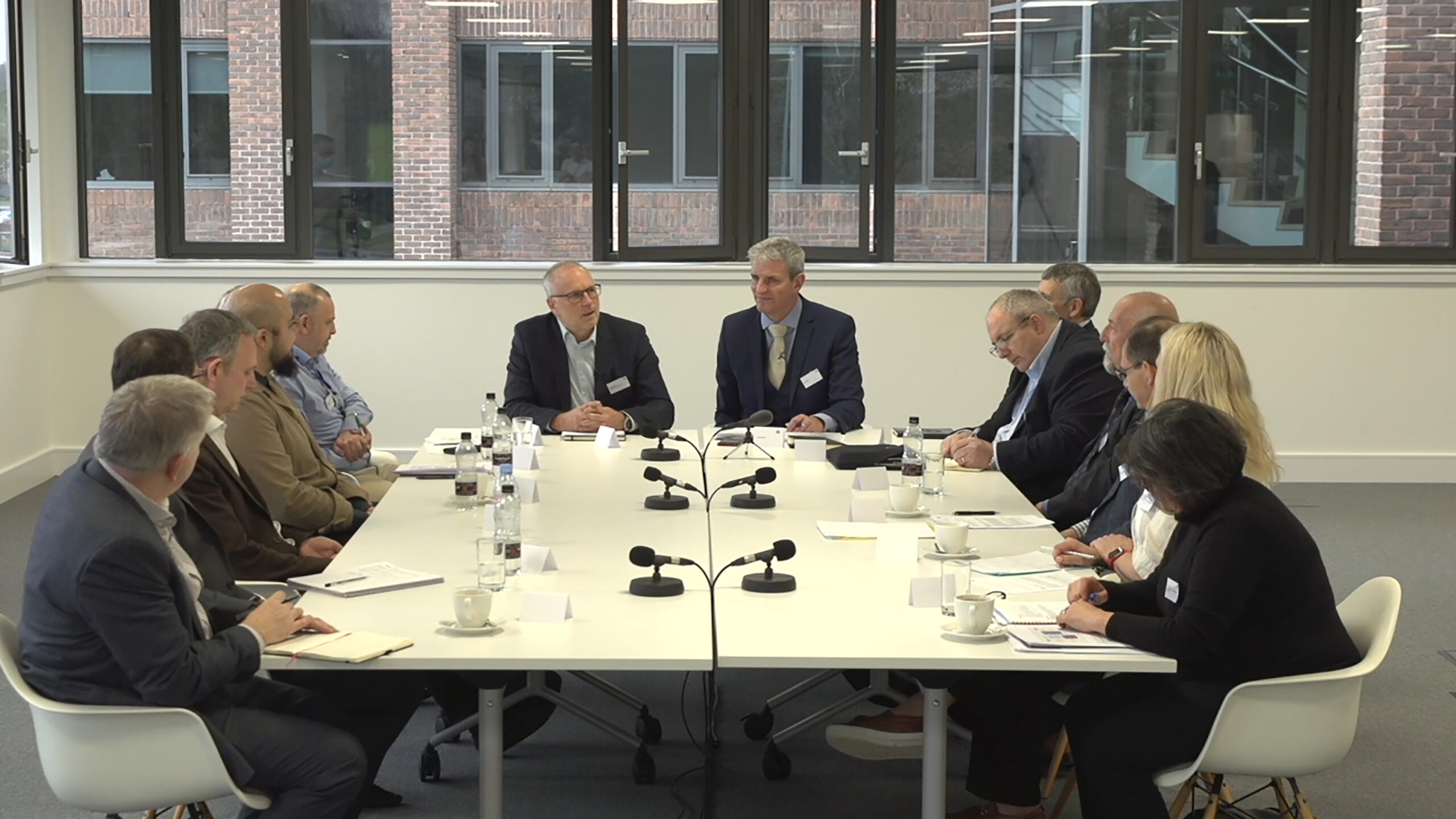To bring innovation through with assurance you need quality approval and time, but in an industry where innovation is fast and assurance is slow what can be done to move forward?
Anna Scothern NHIC:
“We’ve got massive skills shortages, massive productivity issues and massive sustainability challenges that the industry has to face and an area that can unlock that is digital and an area within digital that will unlock it even further is around data usage, data sharing and data capture. Capturing information such as when an installer, when an electrician does an intervention in the home what grade of wires were used what work has actually been done and then that can connect into open data sources. The common vernacular at the moment is ‘property passports’ that allows the homeowner to the understand what has been done to their home and have a single point of truth around what is going on in their home so that when other installers further down the line are coming to do an intervention in that home – a new kitchen, improve carbon efficiency, improve its energy performance they’re able to interrogate the property passport to understand what has been done, what can be done, still maintaining building safety, still maintaining the ‘golden thread’ of data knowledge and all of that technology exists. We just need to put it together because at the minute the jigsaw is not quite there. I think there’s a massive opportunity for digital to unlock and use data better.”

Ehab Sayed, BIOHM:
“We work with waste streams as our raw materials so we collect waste from the fashion industry, food industry and construction and if that’s mushrooms then we work with it in a way that forms high performance construction materials. The construction industry requires these materials to perform at a very high level, they’re consistent and unform level and the risks are too big in construction but at the same time you’ve got a very quick and dynamic response to the process that can quickly take in different waste streams turn them into reliable and tested and accredited materials but the change and the resilience that we build into being able to used localised wate streams actually is kind of slowed down by the kind of static nature of current accreditation processes but I think there are incredible things that are being done right now in the standards world that’s enabling that kind of very quick response and very quick integration of iterative design and development.”

Matthew Sexton, BMI:
“Standards couldn’t keep up with innovation so the BBA was formed as to create an organisation that could fill that gap, could provide very experienced support and technical understanding and look at products there wasn’t a standard for and they could look at them and say ‘ok, but we could test it in this way and we could try this and we could do this’ and actually then gives the time and the customer the reassurance to use that system. To me that’s what the BBA in my mind needs to get back to, it’s that root back to that heart of why it was created and not shall we say certifying systems that have been used and tested over many years but get back to filling the gap of bringing through innovation in a faster way and I think we’re all in agreement standards can’t do. I’m not saying we shouldn’t use standards I sit on a number of BSI committees myself and I’m a big supporter of standards but there is a place for a trusted organisation to fill the gap and give people confidence to use products that haven’t been around long enough to have gone through all that standardisation process and got those types of accreditation.”

Simon Ayers, TrustMark:
“We’ve talked about innovation and disruption. If standards aren’t meeting where they need to be, disrupt them, innovate, do something different. Don’t sit around the table going ‘it doesn’t work’ do something about it because actually data has proven to deliver what we want in terms of things. If we look at where we have been collecting data around retrofit or energy retrofits of property and you validate those products that have been installed you can then start putting those to property typologies and you can start using AI really very effectively to determine what’s going to happen in an area, you bring in the Google open data, you bring in the weather – all of a sudden you’ve got something that is so rich you are allowing consumers and businesses to make really great effective choice so we’ve got it, we’ve just got to accept it’s different and it needs a bit of work to move forward. Does it meet all the standards? Dare I say it probably doesn’t but the trouble is if we stick to this sort of thinking that we’re in these tram lines and we can’t move outside oft hem we will not achieve what we need to. It’s time to disrupt and it’s time to be different. “

Share This Story, Choose Your Platform!
Related Roundtables
To bring innovation through with assurance you need quality approval and time, but in an industry where innovation is fast and assurance is slow what can be done to move forward?
Anna Scothern NHIC:
“We’ve got massive skills shortages, massive productivity issues and massive sustainability challenges that the industry has to face and an area that can unlock that is digital and an area within digital that will unlock it even further is around data usage, data sharing and data capture. Capturing information such as when an installer, when an electrician does an intervention in the home what grade of wires were used what work has actually been done and then that can connect into open data sources. The common vernacular at the moment is ‘property passports’ that allows the homeowner to the understand what has been done to their home and have a single point of truth around what is going on in their home so that when other installers further down the line are coming to do an intervention in that home – a new kitchen, improve carbon efficiency, improve its energy performance they’re able to interrogate the property passport to understand what has been done, what can be done, still maintaining building safety, still maintaining the ‘golden thread’ of data knowledge and all of that technology exists. We just need to put it together because at the minute the jigsaw is not quite there. I think there’s a massive opportunity for digital to unlock and use data better.”

Ehab Sayed, BIOHM:
“We work with waste streams as our raw materials so we collect waste from the fashion industry, food industry and construction and if that’s mushrooms then we work with it in a way that forms high performance construction materials. The construction industry requires these materials to perform at a very high level, they’re consistent and unform level and the risks are too big in construction but at the same time you’ve got a very quick and dynamic response to the process that can quickly take in different waste streams turn them into reliable and tested and accredited materials but the change and the resilience that we build into being able to used localised wate streams actually is kind of slowed down by the kind of static nature of current accreditation processes but I think there are incredible things that are being done right now in the standards world that’s enabling that kind of very quick response and very quick integration of iterative design and development.”

Matthew Sexton, BMI:
“Standards couldn’t keep up with innovation so the BBA was formed as to create an organisation that could fill that gap, could provide very experienced support and technical understanding and look at products there wasn’t a standard for and they could look at them and say ‘ok, but we could test it in this way and we could try this and we could do this’ and actually then gives the time and the customer the reassurance to use that system. To me that’s what the BBA in my mind needs to get back to, it’s that root back to that heart of why it was created and not shall we say certifying systems that have been used and tested over many years but get back to filling the gap of bringing through innovation in a faster way and I think we’re all in agreement standards can’t do. I’m not saying we shouldn’t use standards I sit on a number of BSI committees myself and I’m a big supporter of standards but there is a place for a trusted organisation to fill the gap and give people confidence to use products that haven’t been around long enough to have gone through all that standardisation process and got those types of accreditation.”

Simon Ayers, TrustMark:
“We’ve talked about innovation and disruption. If standards aren’t meeting where they need to be, disrupt them, innovate, do something different. Don’t sit around the table going ‘it doesn’t work’ do something about it because actually data has proven to deliver what we want in terms of things. If we look at where we have been collecting data around retrofit or energy retrofits of property and you validate those products that have been installed you can then start putting those to property typologies and you can start using AI really very effectively to determine what’s going to happen in an area, you bring in the Google open data, you bring in the weather – all of a sudden you’ve got something that is so rich you are allowing consumers and businesses to make really great effective choice so we’ve got it, we’ve just got to accept it’s different and it needs a bit of work to move forward. Does it meet all the standards? Dare I say it probably doesn’t but the trouble is if we stick to this sort of thinking that we’re in these tram lines and we can’t move outside oft hem we will not achieve what we need to. It’s time to disrupt and it’s time to be different. “

Share This Story, Choose Your Platform!
Related Roundtables
Get in touch
Please complete the form below and we will contact you as soon as possible.
To help us to respond to your inquiry as quickly as possible, we have put a handy list of our services below.


